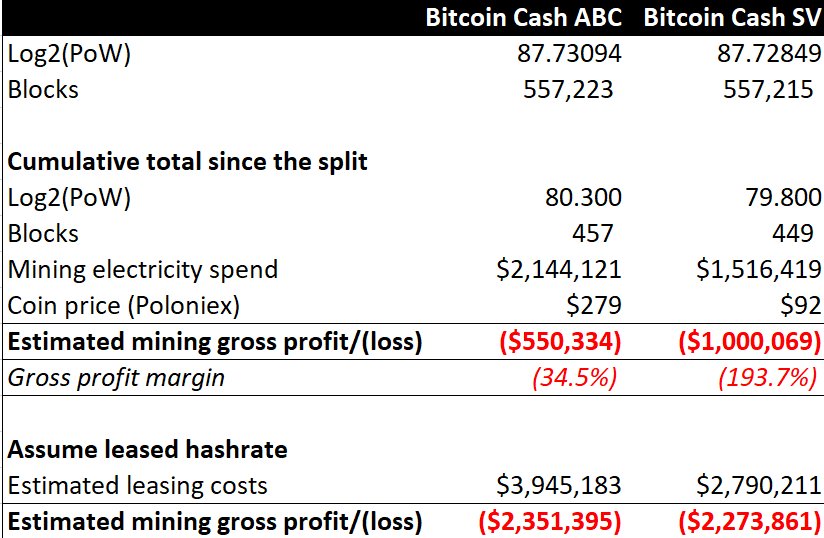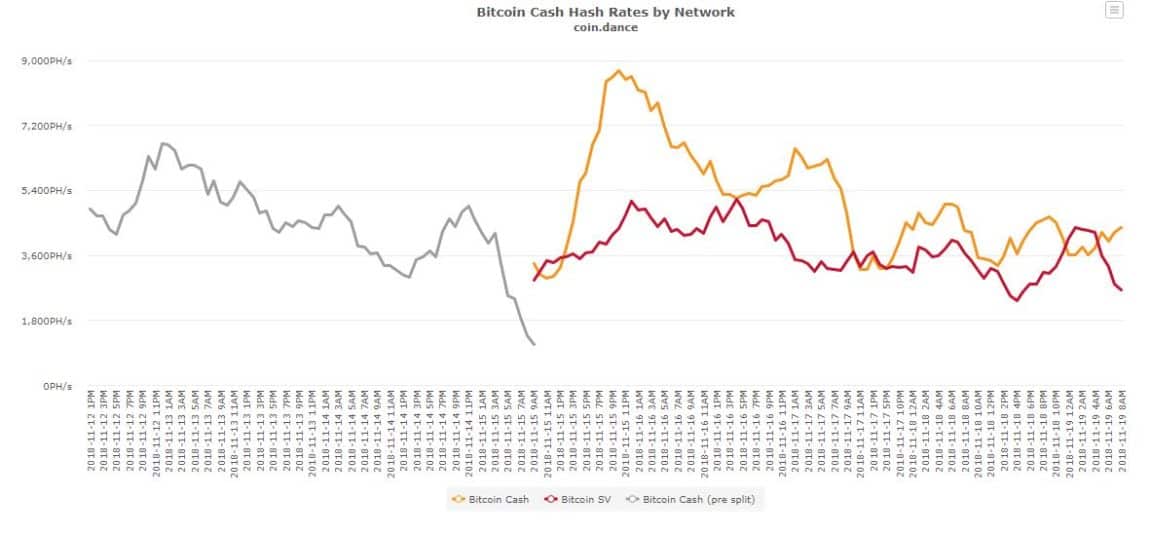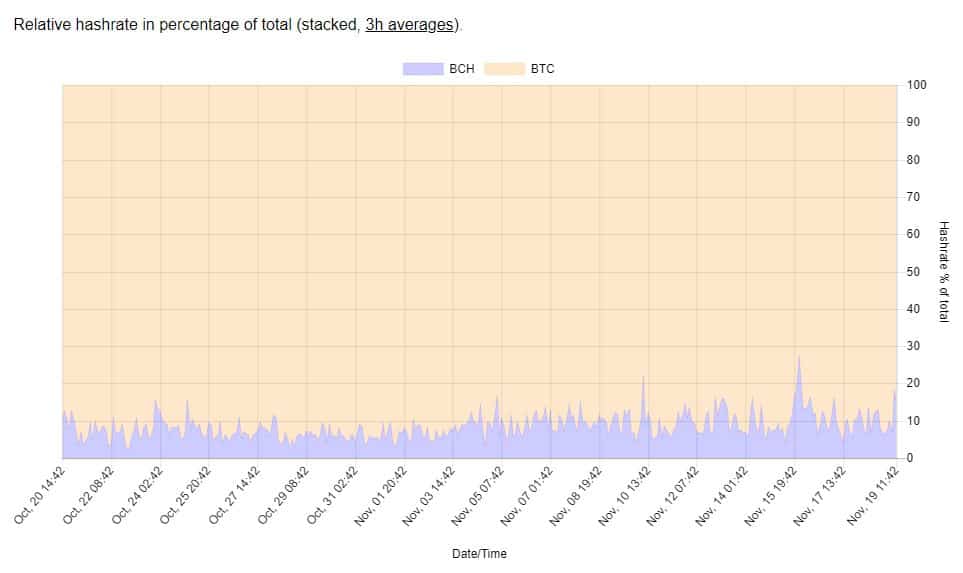Op-Ed: The Bitcoin Cash ‘Hash War’ was Never [Just] about the Hash

Last week, the Bitcoin Cash ecosystem descended into civil war as a group of partisans attempted to use their superior hash power to launch a hostile takeover of the BCH protocol and return it to what they believe was Satoshi Nakamoto’s original vision for Bitcoin. This group, operating under the banner “Bitcoin SV” (BSV), controlled approximately 75 per cent of the network’s hash rate heading into the fork and boasted that they would use this excess computing power to attack the other BCH chain into oblivion.
Bitcoin Cash Hard Fork Less Dramatic than Advertised
Then, a funny thing happened. The hard fork activated, and suddenly BSV no longer had the majority hash rate. Bitcoin ABC (BCHABC) — or as most crypto exchanges have already begun to label it, Bitcoin Cash — quickly established itself as the majority chain, while, for all Craig Wright’s Twitter boasts, the promised SV-led attack never materialized.
BSV proponents cried foul, alleging that BCH proponents were engaging in market manipulation by leasing SHA256 hash power to bolster their chain and secure it from any external attacks. They further warned that the so-called “hash war” is a marathon, not a sprint.

BitMEX Research, incidentally, said that hash power on both chains is “likely to be rented ” and that the two sides have collectively generated as much as nearly $5 million in gross losses as of the time of writing. So much for market manipulation.
As an aside, given the ease with which hash power can be rented and directed at whichever chain the lessee chooses, perhaps BSV should reconsider their chosen governance model. But that’s a discussion for another time.
Never [Just] about the Hash

In any case, the Bitcoin Cash civil war cannot yet be wrapped up with a tidy bow. The hash rate gap narrowed the day following the fork, and at several points — including the hours preceding the writing of this article — BSV temporarily emerged as the chain with the majority hash rate.
And yet, hash rate lead or not, BSV does not appear one iota closer to winning the war for the BCH protocol. With every passing day, more crypto exchanges and other infrastructure providers are declaring Bitcoin ABC’s chain the de facto winner in the fork war and are listing it as “Bitcoin Cash” under the BCH ticker.
At this point, that seems unlikely to change, regardless of how BCH mining power is distributed moving forward because the Bitcoin Cash hash war was never really about the hash. It was about the users, and the hash rate was one of the means through which both chains sought to win them.
Blockchain ecosystems are composed of a variety of different stakeholders, each of whom contributes to the success or failure of the network. In Proof-of-Work (PoW) cryptocurrency ecosystems, miners serve a crucial function, but they are not the only stakeholder and cannot unilaterally dictate terms to the other interested parties.
Miners can throw their weight in one or the other direction to try to tip the scales in that direction, but, at the end of the day, users decide what chain they will use, providing crypto exchanges, infrastructure providers, and yes, miners, with an economic incentive to respond to their wishes.
BCH backers understood this, which is why they leased enough hash rate to secure their chain during the early post-fork period in which the state of play between the two chains remained in doubt. Had BCH activated the hard fork with little miner support and BSV executed a prolonged, disruptive attack on the network, it’s possible — though by no means certain — that users could have lost faith in the BCHABC chain and thrown their lot in with Craig Wright and company.
Hash-for-hire or not, those ASICs secured BCHABC long enough for the chain to firmly establish itself as Bitcoin Cash and Bitcoin SV as the cryptocurrency that forked away. At this point, even an attack so successful that it forced Bitcoin Cash to activate an emergency hard fork to change its PoW algorithm would likely do little to challenge that cryptocurrency’s claim to the BCH branding in the minds of users.

This isn’t a revolutionary concept; we’ve seen it before — one year ago, when Bitcoin Cash itself split off from the main Bitcoin blockchain. The big blockers entered the split arguing that BCH would win the support of miners, even though the majority of users appeared to rally behind BTC. Ultimately, the profit-driven miners stuck with Bitcoin, which is why the BTC hash rate is consistently seven to 10 times as large as BCH’s.
As BitMEX Research argued, it’s unlikely that both sides in the BCH civil war will continue burning millions of dollars to prop up their hash rates indefinitely. Something has to give, and when it does, it will be user- and business-driven branding that puts the final nail in the coffin.
Bitcoin Cash is Bitcoin [Cash]
Whenever there’s a contentious split, branding will be a leading indicator in the outcome.
Let’s again consider the BTC/BCH divorce. To put it bluntly: While the outcome was likely inevitable, Bitcoin Cash lost the BTC civil war the moment its proponents began referring to it as Bitcoin Cash. Ethereum Classic, as the minority Ethereum chain, resigned itself to a similar fate in 2016.
On the one hand, making a clean break from the original blockchain by adopting alternative branding afforded these coins a higher degree of probability of maintaining long-term viability as minority chains; that’s one reason why both BCH and ETC survived the ominous prognostications of their critics. On the other, it virtually ensured that they would always play second fiddle to their larger siblings, even if — in their view — the tune they played was sweeter.
Months later, it seemed that Bitcoin Cash advocates learned from their mistake, as evidenced by the ill-fated “Bitcoin Cash is Bitcoin” campaign, which never really got off the ground. By that point, in the minds of users, Bitcoin was Bitcoin, and Bitcoin Cash was Bitcoin Cash.
Now for a counterexample. SegWit2x, you will remember, refused to follow in Bitcoin Cash’s footsteps and become just another altcoin offshoot. Led by early BTC developer Jeff Garzik, SegWit2x wanted to be Bitcoin or nothing. In the end, riddled with a critical bug on its activation date and abandoned by its chief proponents, it got nothing.
All contentious forks face this dilemma, and whether driven by profit or the belief that a minority existence is better than outright defeat, most choose to go the former route.
Now, we’re beginning to see a similar capitulation on the part of BSV. CoinGeek owner Calvin Ayre has already begun discussing a scenario in which Bitcoin SV “goes its own way” as a separate currency. That might be enough to save BSV from extinction, but, as far as restoring “Satoshi’s vision” back into the BCH protocol goes, they may as well begin waving the white flag.
Disclaimer: The views expressed in the article are solely those of the author and do not represent those of, nor should they be attributed to, CCN.com.
Featured Image from Shutterstock